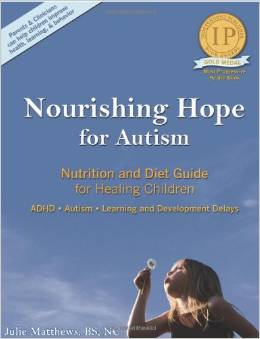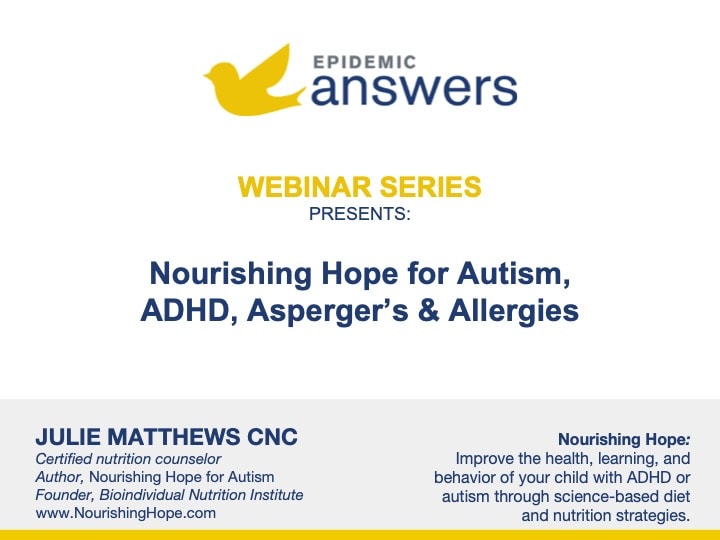We interviewed Julie Matthews CNC about the effectiveness of 13 therapeutic diets for autism as detailed in her latest peer-reviewed medical research article. You can watch the replay below. Please note that you will be asked to provide your email address at the 30-minute mark to continue viewing the replay.
13 Therapeutic Diets for Autism Analyzed
Bioindividual nutritionist Julie Matthews and Jim Adams PhD of the Autism/Asperger’s Research Program at Arizona State University (ASU) evaluated the responses about therapeutic diets from the National Survey on Treatment Effectiveness for Autism. Their results were published in the study Ratings of the Effectiveness of 13 Therapeutic Diets for Autism Spectrum Disorder: Results of a National Survey in 2023.
This study analyzed the effectiveness of therapeutic diets for autism for which there were at least 20 responses. Other diets for which there were less than 20 responses such as the GAPS (Gut and Psychology Syndrome) diet, the low-glutamate diet, the Body Ecology Diet and the low-oxalate diet were not included in the analysis. Therapeutic diets included in the analysis were:
- Ketogenic diet
- Corn-free diet
- Casein-free diet
- Paleo diet
- Soy-free diet
- Gluten-free diet
In This Webinar
In this webinar, Julie helped us understand, according to survey results:
- How was the survey designed? What was the rating scale for responses?
- On the whole, do therapeutic diets for autism help with symptom relief? If so, by how much?
- Which diets had the highest overall benefit? Was this a surprise?
- Did any of these 13 diets have negative effects?
- Were some diets better than others at relief from specific symptoms?
- Which diets had the highest benefit for the largest number of symptoms?
- Were some people following more than one diet at a time?
- Was the ATEC (Autism Treatment Evaluation Checklist) run before and after the survey to correlate against symptom relief? If not, are there plans to do so in the future?
Key Discussions
The Effectiveness of Therapeutic Diets in Managing Autism Symptoms
Different therapeutic diets, such as the ketogenic, Feingold, and GFCF (gluten-free, casein-free) diets, show varied levels of effectiveness in reducing symptoms of autism spectrum disorder (ASD). This effectiveness is measured through improvements in attention, cognition, anxiety, hyperactivit, social interactions and other symptoms. These diets provide alternatives to traditional medications, offering improvements with fewer side effects.
The Role of the Gut Microbiome in Autism
There is a significant interplay between diet, gut health, and autism symptoms. The gut microbiome‘s health influences overall health outcomes, suggesting that dietary interventions targeting gut bacteria could alleviate some symptoms of autism. The correlation prompts further research into specific dietary strategies that could enhance microbiome health and, consequently, symptom management in ASD.
Challenges in Researching Dietary Impacts on Autism
Conducting rigorous research on the impact of diets on autism faces several challenges, including funding constraints, the influence of contradicting industry interests, and survey fatigue among participants. Despite these hurdles, there is a clear need for consistent, reliable research to explore and validate the benefits of various diets, necessitating quantitative analyses and comprehensive studies to substantiate dietary claims.
Importance of Personalized Nutrition
Children with autism exhibit diverse responses to dietary changes, highlighting the need for personalized nutrition. This approach considers unique dietary reactions and the specific nutritional needs of each individual, underlining the necessity of tailored diet plans rather than a one-size-fits-all solution. Personalized diets can optimize health outcomes by addressing specific symptoms and dietary sensitivities present in different individuals.
Comprehensive Approach to Management of Autism
Managing autism symptoms requires a holistic approach that encompasses more than just dietary changes. Factors such as environmental toxins, sensory sensitivities, and other individual health issues are part of the total load of stressors that can additionally affect a child’s ability to heal. Keeping track of your child’s dietary intake and any symptoms that change over the course of two to three days can help you figure out which foods may be negatively affecting your child. We also talked about Jim Adams’ ANRC Autism Treatment Rater iPhone app, which can be helpful in understanding which diets, supplements, medications and therapeutic interventions could be helpful.
Timestamped Overview
00:00 Survey collected diverse data on autism treatments.
06:40 Diets include healthy diet, low-sugar diet, Feingold diet, ketogenic diet, GFCF diet and others.
13:15 Focus on net benefit; healthy diet ranks highest.
18:58 Healthy diet was top for improving health.
21:01 The ketogenic diet was the top diet for seizures, improving various symptoms.
26:08 Study analyzed 700 data points.
34:24 Use of IgG and IgE testing and observation to avoid certain foods can help with symptom improvement.
38:09 Comparing GFCF and ketogenic diets for health.
47:22 Study finds diet affects severity of autism.
55:08 Comparing interventions and symptoms for survey analysis.
01:03:09 Some diets take time to show effects.
01:08:39 Personal opinion on potential benefits of study.
01:11:55 Emphasis on protein, variety, and individual needs.
01:17:17 Study condenses health advice on selecting diets: charts, graphs.
01:25:03 Individuals varies in protein preference, health concerns.
01:25:57 Beef protein, broths, and creative protein options.
01:32:11 Making good choices and healthy living important.
About Julie Matthews CNC
Julie Matthews is a Certified Nutrition Consultant and Education, globally respected nutrition expert, published researcher, accomplished author, and inspirational educator.
Her guidance is backed by sixteen years of clinical experience and scientific research with complex neurological and physiological needs; particularly autism and related disorders.
She has lectured in more than 60 cities across three continents, been on television, radio, newspaper, blogs/podcasts and more, and published scientifically referenced articles in journals and websites.

Julie has been featured by Price-Pottenger, honored by the National Association of Nutrition Professionals and sits on two scientific advisory boards including the Autism Nutrition Research Center. She founded Nourishing Hope in 2005 to stand for the efficacy of improved diet and nutrition for autism, and the BioIndividual Nutrition Institute in 2014 to share the synthesis of her knowledge with cutting edge clinicians to help improve their effectiveness with therapeutic diets.
She published Nourishing Hope for Autism: Nutrition and Diet Guide for Healing Our Children in 2008. You can find out more about her work at her websites nourishinghope.com, bioindividualnutrition.com and nutritionforpregnancy.com.
Disclaimer
This webinar is not a substitute for medical advice, treatment, diagnosis, or consultation with a medical professional. It is intended for general informational purposes only and should not be relied on to make determinations related to treatment of a medical condition. Epidemic Answers has not verified and does not guaranty the accuracy of the information provided in this webinar.
Still Looking for Answers?
Visit the Epidemic Answers Practitioner Directory to find a practitioner near you.
Join us inside our online membership community for parents, Healing Together, where you’ll find even more healing resources, expert guidance, and a community to support you every step of your child’s healing journey.
Sources & References
Ābele, S., et al. Specific Carbohydrate Diet (SCD/GAPS) and Dietary Supplements for Children with Autistic Spectrum Disorder. Proc. Latv. Acad. Sci. 2021;75:417–425.
Adams, J.B., et al. Comprehensive Nutritional and Dietary Intervention for Autism Spectrum Disorder-A Randomized, Controlled 12-Month Trial. Nutrients. 2018 Mar 17;10(3).
Adams, J.B., et al. Effect of a vitamin/mineral supplement on children and adults with autism. BMC Pediatr. 2011;11:111.
Adams, J.B., et al. Gastrointestinal Flora and Gastrointestinal Status in Children with Autism—Comparisons to Typical Children and Correlation with Autism Severity. BMC Gastroenterol. 2011;11:22.
Adams, J.B., et al. Nutritional and metabolic status of children with autism vs. neurotypical children, and the association with autism severity. Nutr Metab (Lond). 2011 Jun 8;8(1):34.
Adams, J.B., et al. Vitamin/mineral/micronutrient supplement for autism spectrum disorders: a research survey. BMC Pediatr. 2022 Oct 13;22(1):590.
Alberti, A., et al. Sulphation Deficit in “Low-Functioning” Autistic Children: A Pilot Study. Biol. Psychiatry. 1999;46:420–424.
Ashraghi, R.S., et al. Early Disruption of the Microbiome Leading to Decreased Antioxidant Capacity and Epigenetic Changes: Implications for the Rise in Autism. Front. Cell. Neurosci., 15 Aug 2018.
Barnhill, K., et al. Brief Report: Implementation of a Specific Carbohydrate Diet for a Child with Autism Spectrum Disorder and Fragile X Syndrome. J. Autism Dev. Disord. 2020;50:1800–1808.
Berding, K., et al. Diet Can Impact Microbiota Composition in Children With Autism Spectrum Disorder. Front. Neurosci. 2018;12:515.
Bjørklund, G., et al. Gastrointestinal alterations in autism spectrum disorder: What do we know? Neurosci Biobehav Rev. 2020 Nov:118:111-120.
Blaylock, R.L. A possible central mechanism in autism spectrum disorders, part 3: the role of excitotoxin food additives and the synergistic effects of other environmental toxins. Altern Ther Health Med. 2009 Mar-Apr;15(2):56-60.
Blaylock, R.L., et al. Immune-glutamatergic dysfunction as a central mechanism of the autism spectrum disorders. Curr Med Chem. 2009;16(2):157-70.
Bourre, J.M. Effects of nutrients (in food) on the structure and function of the nervous system: update on dietary requirements for brain. Part 1: micronutrients. J Nutr Health Aging. 2006 Sep-Oct;10(5):377-85.
Bourre, J.M. Effects of nutrients (in food) on the structure and function of the nervous system: update on dietary requirements for brain. Part 2 : macronutrients. J Nutr Health Aging. 2006 Sep-Oct;10(5):386-99.
Buie, T., et al. Evaluation, diagnosis, and treatment of gastrointestinal disorders in individuals with ASDs: a consensus report. Pediatrics. 2010 Jan;125 Suppl 1:S1-18.
Buie, T., et al. Recommendations for evaluation and treatment of common gastrointestinal problems in children with ASDs. Pediatrics. 2010 Jan;125 Suppl 1:S19-29.
Cekici, H., et al. Current Nutritional Approaches in Managing Autism Spectrum Disorder: A Review. Nutr. Neurosci. 2019;22:145–155.
Chistol, L.T., et al. Sensory Sensitivity and Food Selectivity in Children with Autism Spectrum Disorder. J. Autism Dev. Disord. 2018;48:583–591.
De Magistris, et al. Alterations of the intestinal barrier in patients with autism spectrum disorders and in their first-degree relatives. J Pediatr Gastroenterol Nutr. 2010;51(4):418-24.
De Magistris. L., et al. Antibodies against Food Antigens in Patients with Autistic Spectrum Disorders. BioMed Res. Int. 2013;2013:729349.
Doreswamy, S., et al. Effects of Diet, Nutrition, and Exercise in Children With Autism and Autism Spectrum Disorder: A Literature Review. Cureus. 2020;12:e12222.
Dyńka, D., et al. The Role of Ketogenic Diet in the Treatment of Neurological Diseases. Nutrients. 2022 Nov 24;14(23):5003.
El-Ansary, A. GABA and Glutamate Imbalance in Autism and Their Reversal as Novel Hypothesis for Effective Treatment Strategy. Autism and Developmental Disorders. 18, no. 3 (2020): 46-63.
El-Rashidy, O., et al. Ketogenic Diet versus Gluten Free Casein Free Diet in Autistic Children: A Case-Control Study. Metab. Brain Dis. 2017;32:1935–1941.
Erickson, C.A., et al. Gastrointestinal Factors in Autistic Disorder: A Critical Review. Journal of Autism and Developmental Disorders. 2005 Dec;35(6):713-27.
Fattorusso, A., et al. Autism Spectrum Disorders and the Gut Microbiota. Nutrients. 2019 Feb 28;11(3):521.
Feingold, B.F. Hyperkinesis and Learning Disabilities Linked to Artificial Food Flavors and Colors. Am. J. Nurs. 1975;75:797–803.
Ghalichi, F., et al. Effect of Gluten Free Diet on Gastrointestinal and Behavioral Indices for Children with Autism Spectrum Disorders: A Randomized Clinical Trial. World J. Pediatr. 2016;12:436–442.
Ghanizadeh, A. Increased glutamate and homocysteine and decreased glutamine levels in autism: a review and strategies for future studies of amino acids in autism. Dis Markers. 2013;35(5):281-6
Gough, S., et al. Neuroprotection by the Ketogenic Diet: Evidence and Controversies. Front Nutr. 2021 Nov 23:8:782657.
Grimaldi, R., et al. A prebiotic intervention study in children with autism spectrum disorders (ASDs). Microbiome. 2018 Aug 2;6(1):133.
Hadjivassiliou, M., et al. Gluten sensitivity: from gut to brain. Lancet Neurol. 2010 Mar;9(3):318-30.
Hartman, R.E., et al. Dietary Approaches to the Management of Autism Spectrum Disorders. Adv. Neurobiol. 2020;24:547–571.
Hejitz, R.D., et al. Normal gut microbiota modulates brain development and behavior. Proc Natl Acad Sci U S A. 2011 Feb 15;108(7):3047-52.
Herbert, M.R., et al. Autism and Dietary Therapy: Case Report and Review of the Literature. J. Child. Neurol. 2013;28:975–982.
Hopf, K.P., et al. Use and Perceived Effectiveness of Complementary and Alternative Medicine to Treat and Manage the Symptoms of Autism in Children: A Survey of Parents in a Community Population. J. Altern. Complement. Med. 2016;22:25–32.
Horn, J., et al. Role of Diet and Its Effects on the Gut Microbiome in the Pathophysiology of Mental Disorders. Transl. Psychiatry. 2022;12:164.
Horvath, K., et al. Autistic disorder and gastrointestinal disease. Current Opinion in Pediatrics. 2002 Oct;14(5):583-7.
Horvath, K., et al. Gastrointestinal abnormalities in children with autistic disorder. Journal of Pediatrics. 1999 Nov;135(5):559-63.
Hsu, C.-L., et al. The Effects of a Gluten and Casein-Free Diet in Children with Autism: A Case Report. Chang Gung Med. J. 2009;32:459–465.
Isaksson, J., et al. Brief Report: Association Between Autism Spectrum Disorder, Gastrointestinal Problems and Perinatal Risk Factors Within Sibling Pairs. J Autism Dev Disord. 2017 Aug;47(8):2621-2627.
Jyonouchi, H., et al. Dysregulated innate immune responses in young children with autism spectrum disorders: their relationship to gastrointestinal symptoms and dietary intervention. Neuropsychobiology. 2005;51(2):77-85.
Jyonouchi, H., et al. Evaluation of an Association between Gastrointestinal Symptoms and Cytokine Production against Common Dietary Proteins in Children with Autism Spectrum Disorders. J. Pediatr. 2005;146:605–610.
Jyonouchi, H., et al. Innate Immunity Associated with Inflammatory Responses and Cytokine Production against Common Dietary Proteins in Patients with Autism Spectrum Disorder. Neuropsychobiology. 2002;46:76–84.
Kałużna-Czaplińska, J., et al. Nutritional Strategies and Personalized Diet in Autism-Choice or Necessity? Trends Food Sci. Technol. 2016;49:45–50.
Karagözlü, S., et al. The Relationship of Severity of Autism with Gastrointestinal Symptoms and Serum Zonulin Levels in Autistic Children. J. Autism Dev. Disord. 2022;52:623–629.
Karhu, E., et al. Nutritional interventions for autism spectrum disorder. Nutr Rev. 2020 Jul 1;78(7):515-531.
Kawicka, A., et al. How Nutritional Status, Diet and Dietary Supplements Can Affect Autism. A Review. Rocz. Panstw. Zakl. Hig. 2013;64:1–12.
Knivsberg, A.M., et al. A Randomised, Controlled Study of Dietary Intervention in Autistic Syndromes. Nutr. Neurosci. 2002;5:251–261.
Konstantynowicz, J., et al. A Potential Pathogenic Role of Oxalate in Autism. Eur. J. Paediatr. Neurol. 2012;16:485–491.
Kushak, R.I., et al. Intestinal Disaccharidase Activity in Patients with Autism: Effect of Age, Gender, and Intestinal Inflammation. Autism. 2011;15:285–294.
Lai, C.C.W., et al. The association between gut-health promoting diet and depression: A mediation analysis. J Affect Disord. 2023 Mar 1:324:136-142.
Lee, R.W.Y., et al. A modified ketogenic gluten-free diet with MCT improves behavior in children with autism spectrum disorder. Physiol Behav. 2018 May 1:188:205-211.
Li, C., et al. Study on Aberrant Eating Behaviors, Food Intolerance, and Stereotyped Behaviors in Autism Spectrum Disorder. Front. Psychiatry. 2020;11:493695.
Li, Q., et al. A Ketogenic Diet and the Treatment of Autism Spectrum Disorder. Front Pediatr. 2021 May 11:9:650624.
Lionetti, E., et al. Gluten Psychosis: Confirmation of a New Clinical Entity. Nutrients. 2015 Jul 8;7(7):5532-9.
Lucarelli, S., et al. Food Allergy and Infantile Autism. Panminerva Med. 1995;37:137–141.
Madra, M., et al. Gastrointestinal Issues and Autism Spectrum Disorder. Psychiatr Clin North Am. 2021 Mar; 44(1): 69–81.
Mandecka, A., et al. The importance of nutritional management and education in the treatment of autism. Rocz. Panstw. Zakl. Hig. 2022;73:247–258. [
Marí-Bauset, S., et al. Nutritional Impact of a Gluten-Free Casein-Free Diet in Children with Autism Spectrum Disorder. J. Autism Dev. Disord. 2016;46:673–684.
Matthews, J.S., et al. Ratings of the Effectiveness of 13 Therapeutic Diets for Autism Spectrum Disorder: Results of a National Survey. J Pers Med. 2023 Sep 29;13(10):1448.
McCann, D., et al. Food Additives and Hyperactive Behaviour in 3-Year-Old and 8/9-Year-Old Children in the Community: A Randomised, Double-Blinded, Placebo-Controlled Trial. Lancet. 2007;370:1560–1567.
Mesleh, A.G., et al. Paving the Way toward Personalized Medicine: Current Advances and Challenges in Multi-OMICS Approach in Autism Spectrum Disorder for Biomarkers Discovery and Patient Stratification. J. Pers. Med. 2021;11:41.
Molina-López, J., et al. Food Selectivity, Nutritional Inadequacies, and Mealtime Behavioral Problems in Children with Autism Spectrum Disorder Compared to Neurotypical Children. Int. J. Eat. Disord. 2021;54:2155–2166.
Mu, C., et al. Metabolic Framework for the Improvement of Autism Spectrum Disorders by a Modified Ketogenic Diet: A Pilot Study. J Proteome Res. 2020 Jan 3;19(1):382-390.
Nemecheck, P., et al. Autism Spectrum Disorder Symptoms Improve with Combination Therapy Directed at Improving Gut Microbiota and Reducing Inflammation. Applied Psychiatry. 2020 Jul; (1)1.
O’Hara, N.H., et al. The recovery of a child with autism spectrum disorder through biomedical interventions. Altern Ther Health Med. 2008 Nov-Dec;14(6):42-4.
Olivito, I., et al. Ketogenic diet ameliorates autism spectrum disorders-like behaviors via reduced inflammatory factors and microbiota remodeling in BTBR T+ Itpr3tf/J mice. Exp Neurol. 2023 Aug:366:114432.
Pelsser, L.M., et al. Effects of a restricted elimination diet on the behaviour of children with attention-deficit hyperactivity disorder (INCA study): a randomised controlled trial. Lancet. 2011 Feb 5;377(9764):494-503.
Pietrzak, D., et al. The Therapeutic Role of Ketogenic Diet in Neurological Disorders. Nutrients. 2022 May 6;14(9):1952.
Piwowarczyk, A., et al. Gluten-Free Diet in Children with Autism Spectrum Disorders: A Randomized, Controlled, Single-Blinded Trial. J. Autism Dev. Disord. 2020;50:482–490.
Quan, L., et al. A Systematic Review and Meta-Analysis of the Benefits of a Gluten-Free Diet and/or Casein-Free Diet for Children with Autism Spectrum Disorder. Nutr. Rev. 2022;80:1237–1246.
Qureshi, F., et al. Multivariate Analysis of Metabolomic and Nutritional Profiles among Children with Autism Spectrum Disorder. J. Pers. Med. 2022;12:923.
Rimland, B., et al. Parent Ratings of Behavioral Effects of Biomedical Interventions. Autism Research Institute Newsletter. Volume 34 ARI Publication; San Diego, CA, USA: 2009.
Ristori, M.V., et al. Autism, Gastrointestinal Symptoms and Modulation of Gut Microbiota by Nutritional Interventions. Nutrients. 2019;11:2812.
Smith, J., et al. Ketogenic diet restores aberrant cortical motor maps and excitation-to-inhibition imbalance in the BTBR mouse model of autism spectrum disorder. Behav Brain Res. 2016 May 1:304:67-70.
Stafstrom, C.E., et al. The ketogenic diet as a treatment paradigm for diverse neurological disorders. Front Pharmacol. 2012 Apr 9:3:59.
Swann., O.G., et al. Dietary fiber and its associations with depression and inflammation. Nutr Rev. 2020 May 1;78(5):394-411.
Tan S., et al. The Association between Sugar-Sweetened Beverages and Milk Intake with Emotional and Behavioral Problems in Children with Autism Spectrum Disorder. Front. Nutr. 2022;9:927212.
Theoharides, T.C. Is a subtype of autism an allergy of the brain? Clin Ther. 2013; 35(5):584-91.
Tomova, A., et al. The Influence of Food Intake Specificity in Children with Autism on Gut Microbiota. Int. J. Mol. Sci. 2020;21:2797.
Vargas, D.D., et al. Effectiveness of nutritional interventions on behavioral symptomatology of autism spectrum disorder: a systematic review. Nutr Hosp. 2022 Dec 20;39(6):1378-1388.
Verena, L., et al. Elimination diets’ efficacy and mechanisms in attention deficit hyperactivity disorder and autism spectrum disorder. Eur Child Adolesc Psychiatry. 2017; 26(9): 1067–1079.
Vita, A.A., et al. Associations between Food-Specific IgG Antibodies and Intestinal Permeability Biomarkers. Front. Nutr. 2022;9:962093.
Vojdani, A., et al. A Gut Feeling for Immune Dysregulation & Neuroinflammation in Autism. The Autism File. 2009(31).
Wang, J., et al. Global Prevalence of Autism Spectrum Disorder and Its Gastrointestinal Symptoms: A Systematic Review and Meta-Analysis. Front. Psychiatry. 2022;13:963102.
Wang, L., et al. Gastrointestinal microbiota and metabolite biomarkers in children with autism spectrum disorders. Biomark Med. 2014;8(3):331-44.
Wang, X., et al. Association between Dietary Quality and Executive Functions in School-Aged Children with Autism Spectrum Disorder. Front. Nutr. 2022;9:940246.
Warner, B.B. The contribution of the gut microbiome to neurodevelopment and neuropsychiatric disorders. Pediatr Res. 2019 Jan;85(2):216-224.
Wasilewska, J., et al. Gastrointestinal symptoms and autism spectrum disorder: links and risks – a possible new overlap syndrome. Pediatric Health Med Ther. 2015; 6: 153–166.
Westmark, C.J. Soy Infant Formula and Seizures in Children with Autism: A Retrospective Study. PLoS ONE. 2014;9:e80488.
Whiteley, P., et al. The ScanBrit Randomised, Controlled, Single-Blind Study of a Gluten- and Casein-Free Dietary Intervention for Children with Autism Spectrum Disorders. Nutr. Neurosci. 2010;13:87–100.
Williams, B.L., et al. Impaired Carbohydrate Digestion and Transport and Mucosal Dysbiosis in the Intestines of Children with Autism and Gastrointestinal Disturbances. PLoS ONE. 2011;6:e24585.
Yu, Y., et al. Efficacy and Safety of Diet Therapies in Children With Autism Spectrum Disorder: A Systematic Literature Review and Meta-Analysis. Front. Neurol. 2022;13:844117.
Resources
Articles
CBS News: ADHD Diet Study Suggests Healthy Eating May Help Kids
Chicago Tribune: Do Diet Changes Help ADHD Children?
The Feingold Diet: Our Family’s Experience with a Dye-Free Diet
Julie Matthew’s BioIndividual Nutrition recipes
Julie Matthew’s BioIndividual Nutrition Feingold Diet / Failsafe Diet
Our Journey with the Feingold Diet
Books
Adams, Mike. The Truth About Aspartame, MSG and Excitoxins. Truth Publishing, Inc., 2010.
Ballantyne, Sarah. Paleo Approach: Reverse Autoimmune Disease Heal Your Body. Victory Belt Publishing, 2014.
Blaylock, Russell L. Excitotoxins: The Taste That Kills. Health Press, 1996.
Bock, Kenneth. Healing the New Childhood Epidemics: Autism, ADHD, Asthma, and Allergies: The Groundbreaking Program for the 4-A Disorders. New York, NY. Ballantine Books, 2008.
Campbell-McBride, Natasha. Gut and Psychology Syndrome: Natural Treatment for Autism, Dyspraxia, A.D.D., Dyslexia, A.D.H.D., Depression, Schizophrenia, 2010.
Cordain, Loren. The Paleo Diet Revised: Lose Weight and Get Healthy by Eating the Foods You Were Designed to Eat. Harvest, 2010.
Davis, Sheri. All Natural Mom’s Guide to the Feingold Diet: A Natural Approach to ADHD and Other Related Disorders. Sheri Davis, 2014.
Ernsperger, Lori, et al. Just Take a Bite: Easy, Effective Answers to Food Aversions and Eating Challenges! Future Horizons, 2004.
Feingold, Ben. The Feingold Cookbook for Hyperactive Children, and Others Associated with Food Additives and Salicylates. Random House, 1979.
Feingold, Ben. Why Your Child Is Hyperactive: The Bestselling Book on How ADHD Is Caused by Artificial Food Flavors and Colors. Random House, 1985.
Galland, Leo. The Effect of Intestinal Microbes on Systemic Immunity. Excerpted from Power Healing. Random House, 1998.
Giustra-Kozek, Jennifer. Healing without hurting: treating ADHD, apraxia, and autism spectrum disorders naturally and effectively without harmful medication. Howard Beach, NY: Changing Lives Press, 2014.
Herbert, Martha, Weintraub Karen. The Autism Revolution: Whole-Body Strategies for Making Life All It Can Be. New York: Ballantine Books; 2012.
Hersey, Jane. Why Can’t My Child Behave?: Why Can’t She Cope? Why Can’t He Learn? The Feingold Diet Updated for Today’s Busy Families. Pear Tree Press, 2014.
Hong, Maria Rickert. Almost Autism: Recovering Children from Sensory Processing Disorder, A Reference for Parents and Practitioners. 2014.
Lambert, Beth. A Compromised Generation: The Epidemic of Chronic Illness in America’s Children. Sentient Publications, 2010.
Lemer, Patricia S. Outsmarting Autism: The Ultimate Guide to Management, Healing and Prevention for Individuals with Autism Spectrum Disorders. Tarentum, PA, Word Association Publishers, 2014.
Matthews, Julie. Nourishing Hope for Autism: Nutrition and Diet Guide for Healing Our Children. Healthful Living Media, 2008.
Scott, Trudy. The Antianxiety Food Solution: How the Foods You Eat Can Help You Calm Your Anxious Mind, Improve Your Mood and End Cravings. New Harbinger Publications, 2011.
Seroussi, Karyn. Unraveling the Mystery of Autism and Pervasive Developmental Disorder: A Mother’s Story of Research and Recovery. New York: Simon & Schuster, 2000.
Sisson, Mark. The Primal Blueprint: Reprogram Your Genes for Effortless Weight Loss, Vibrant Health, and Boundless Energy. Primal Nutrition, Inc., 2019.
Tam, Michelle, et al. Nom Nom Paleo: Food for Humans (Volume 1). Andrews McMeel Publishing, 2013.
Voegtlin, Walter. The Stone Age Diet: Based on In-depth Studies of Human Ecology and the Diet of Man. Vantage Press, 1975.
Wahls, Terry. The Wahls Protocol: A Radical New Way to Treat All Chronic Autoimmune Conditions Using Paleo Principles. Avery, 2020.
Wahls, Terry. The Wahls Protocol Cooking for Life: The Revolutionary Modern Paleo Plan to Treat All Chronic Autoimmune Conditions. Avery, 2017.
Phone Apps
Websites
Amy Yasko’s list of foods with high free glutamates
Katie Reid’s pantry list of recommended foods.
Unblind My Mind: Dr. Katie Reid’s website gives extensive explanation about the science, a TED talk by Dr. Reid and video tutorials to help parent’s discern appropriate foods in a local supermarket.
Videos
Excitotoxins, Neurotoxins & Human Neurological Disease Lecture by Russell Blaylock MD
Glutamate, Excitoxicity and Autism
Minding your mitochondria | Dr. Terry Wahls | TEDxIowaCity
Unblind My Mind: What Are We Eating? Dr. Katherine Reid at TEDxYouth@GrassValley



